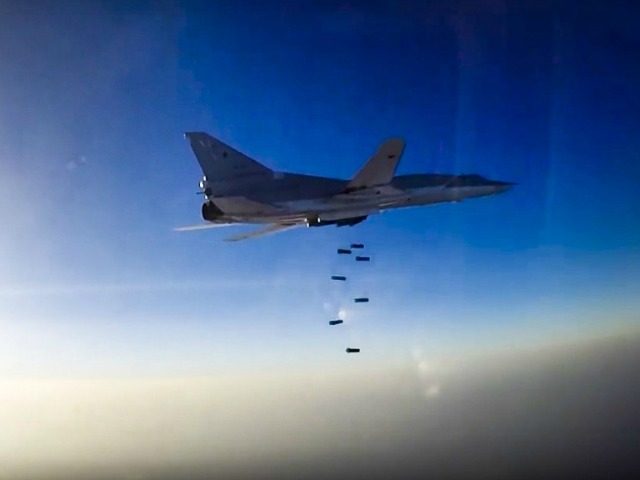Iran and Russia are both claiming Russia’s withdrawal from Iran’s Hamadan Airbase has occurred because Russia’s operations in Syria from the base have concluded, but the timing follows some harsh words from Iranian officials accusing the Russians of “ungentlemanly” boasting about their operations in Iran.
Russian war planes had been using the Shahid Nojeh Air Base to refuel and launch operations in Syria in support of dictator Bashar al-Assad, a longtime ally of both Russia and Iran, for the past week. While Russian officials asserted the targets were “terrorist” groups in the region, American analysts noted that target locations did not have a significant Islamic State presence.
The move was the first of its kind in modern history – the first time a major world power had the privilege of using an Iranian airbase following the Islamic Revolution – and a sign that Russia and Iran were eager to expand their cooperation to fight Sunni anti-Assad rebels in Syria. While Russia has been flying air missions in Syria for some time, Iran denies a presence of its official military there, claiming that only “volunteers” are on the ground in Syria.
The direct cooperation proved to be short-lived. The Iranian Foreign Ministry confirmed on Monday that Russia had withdrawn all its planes from Hamadan. “It is finished, for now,” spokesman Bahram Ghasemi told reporters, adding that the move was always believed to be “temporary.”
The Associated Press notes the announcement closely followed criticism from Iran condemning Russian officials for making their cooperation public. “Russians are interested to show they are a superpower to guarantee their share in political future of Syria and, of course, there has been a kind of show-off and ungentlemanly (attitude) in this field,” Ghasemi had said shortly before announcing an end to the operation.
The AP suggests that there may have been an agreement between the two governments not to make public the use of Hamadan by Russian troops, hence the irritation with Russia’s boasting: “Dehghan’s remarks also suggest Russia and Iran initially agreed to keep Moscow’s use of the air base quiet. Its announcement likely worried Iran’s Sunni-ruled Mideast neighbors, which host American military personnel.”
BBC adds that there was reportedly resistance from Iranian “hard-liners” in the nation’s legislature to allowing Russian military assets to use the base, noting that the legislature must approve such uses as per the nation’s Constitution.
Iran’s Fars News agency also quotes Secretary of Iran’s Supreme National Security Council (SNSC) Ali Shamkhani as stating that Russia withdrew its planes last Thursday, but does not mention Ghasemi’s criticism. It does explicitly deny that international pressure, implying American objections to the move, had anything to do with the withdrawal. The state-run agency also clarifies that the cooperation is “a sign of might and not dependence,” potentially assuaging fears within Iran that the government does not feel capable of fighting Sunni Islamic State terrorists and Syrian rebels on its own.
Fars also cites Russian news agency Interfax as quoting Russian Ambassador to Iran Levan Djagaryan having said that “Moscow sees no obstacles to the further use of Iranian infrastructure, including the air base in Hamadan, for strikes against terrorists in Syria.”
Disagreements between Iran and Russia in their Syria strategy could be significantly detrimental to Assad, whose army has proven unable to push back the various rebel groups, the Nusra Front, the Islamic State, and the Kurdish YPG and PKK militias all at the same time. Perhaps as a sign that Assad is working to hedge his bets on Russia and Iran, Damascus hosted Chinese Admiral Guan Youfei last week for talks on how to further military cooperation between Syria and China.

COMMENTS
Please let us know if you're having issues with commenting.